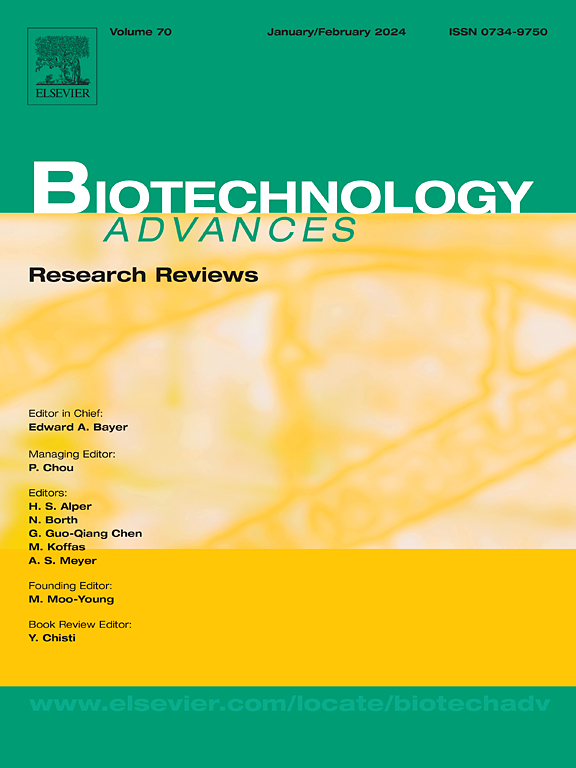高效积累类黄酮的工程植物宿主:进展、挑战与展望
IF 12.5
1区 工程技术
Q1 BIOTECHNOLOGY & APPLIED MICROBIOLOGY
引用次数: 0
摘要
黄酮类化合物是一类重要的化合物,有助于植物抵抗,也有益于人体健康。增加植物类黄酮含量或使特定类黄酮的合成能够增强其对生物和非生物胁迫的抵抗力,同时增加其营养价值,从而支持可持续农业实践。尽管许多研究都集中在增加植物中类黄酮的含量,但传统的工程策略缺乏选择性调节单个类黄酮合成所需的精度。相比之下,系统和合成生物学为解决这些挑战提供了创新的方法。本文就黄酮类化合物在植物中的分布、生物合成途径及转录调控等方面的研究进展进行综述。随后,我们分析了目前在改变植物类黄酮含量方面的进展,包括转录调控、转运蛋白工程和提高速率限制步骤。此外,我们总结了精确改变类黄酮生物合成途径的潜在策略,包括选择理想宿主,指定人工修饰的遗传元件,通过蛋白质工程加速酶的进化,增强级联生物催化和代谢通量,以及重新平衡代谢通量。最后,我们讨论了构建下一代高效类黄酮生物合成植物宿主的局限性和前景。本文旨在为应用系统生物学和合成生物学方法对植物类黄酮生物合成过程进行修饰和重构提供理论指导。本文章由计算机程序翻译,如有差异,请以英文原文为准。
Engineering plant hosts for high-efficiency accumulation of flavonoids: Advances, challenges and perspectives
Flavonoids are a vital class of compounds that contribute to plant resistance and also beneficial to human health. Increasing plant flavonoid content or enabling the synthesis of specific flavonoids can enhance plant resistance to biotic and abiotic stress while augmenting their nutritional value, thereby supporting sustainable agricultural practices. Although numerous studies have focused on increasing flavonoid content in plants, traditional engineering strategies lack the precision required to selectively regulate the synthesis of individual flavonoids. In contrast, systems and synthetic biology provide innovation approaches to address these challenges. Here, we summarize research on the distribution, biosynthetic pathways, and transcriptional regulation of flavonoids in plants. Subsequently, we analyze current progress in altering plant-flavonoid content, including transcriptional regulation, transporter engineering, and lifting rate-limiting steps. Additionally, we summarize potential strategies for precisely altering flavonoid biosynthetic pathways, including the selection of ideal hosts, designating artificially modifiable genetic elements, accelerating enzyme evolution by protein engineering, enhancing cascade biocatalysis and metabolic flux, and rebalancing metabolic fluxes. Finally, we discuss current limitations and prospects for building a next-generation plant hosts for high-efficiency flavonoid biosynthesis. This review aims to provide theoretical guidance for the modification and reconstruction of flavonoid biosynthesis in plants using systems and synthetic biology approaches.
求助全文
通过发布文献求助,成功后即可免费获取论文全文。
去求助
来源期刊

Biotechnology advances
工程技术-生物工程与应用微生物
CiteScore
25.50
自引率
2.50%
发文量
167
审稿时长
37 days
期刊介绍:
Biotechnology Advances is a comprehensive review journal that covers all aspects of the multidisciplinary field of biotechnology. The journal focuses on biotechnology principles and their applications in various industries, agriculture, medicine, environmental concerns, and regulatory issues. It publishes authoritative articles that highlight current developments and future trends in the field of biotechnology. The journal invites submissions of manuscripts that are relevant and appropriate. It targets a wide audience, including scientists, engineers, students, instructors, researchers, practitioners, managers, governments, and other stakeholders in the field. Additionally, special issues are published based on selected presentations from recent relevant conferences in collaboration with the organizations hosting those conferences.
 求助内容:
求助内容: 应助结果提醒方式:
应助结果提醒方式:


